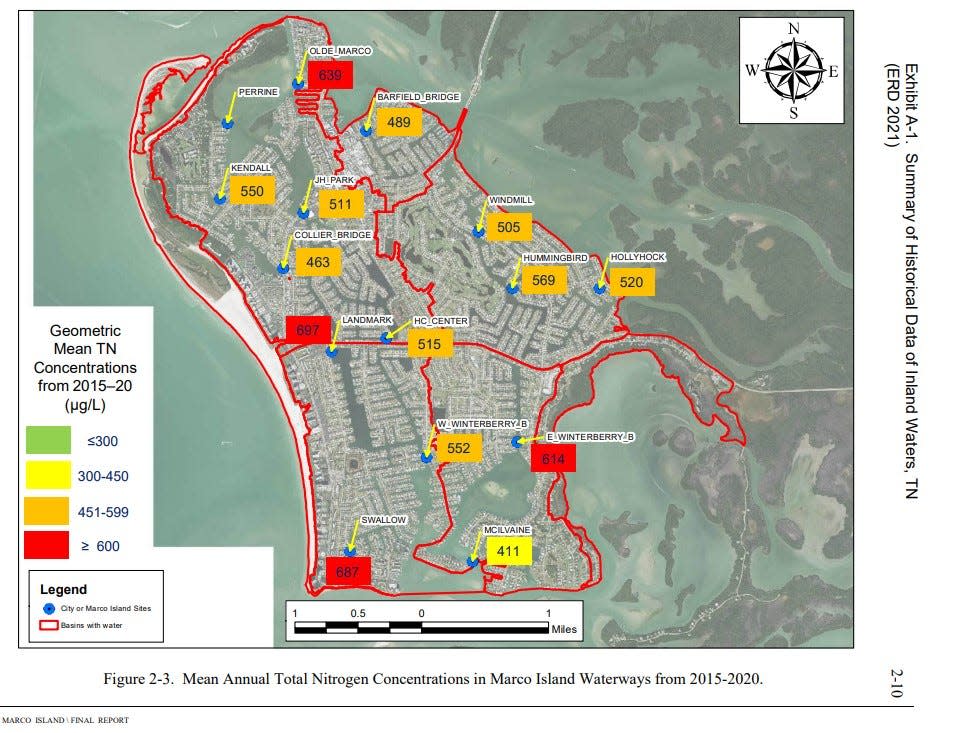Marco Island’s water quality improves, city to get off Florida's impaired waterways list.
Marco Island has a plan to improve its waterways and rid them of toxic nitrogen levels that breed algae blooms and overstimulate aquatic plants.
That plan will get the city off Florida’s impaired waterways list and help to satisfy concerns from residents raised more than five years ago.
The city’s improvements plan was accepted earlier this month by state and federal regulators. Since 2019, Marco Island has been on the Florida Department of Environmental Protection’s (FDEP) impaired waterways list. That means the waterways had at least two years of noncompliance with allowed levels of toxins.
What’s the issue?

The problem is too much nitrogen. Nitrogen levels in the city's canals have been above standards set by the DEP since 2017. Excess nitrogen can cause overstimulation and growth of aquatic plants and algae. Excessive growth of these organisms, in turn, can clog water intakes, use up dissolved oxygen as they decompose, and block light to deeper waters, according to United States Geological Survey.
Once a waterbody is designated as impaired, it is required by state law to implement a TMDL, or Total Maximum Daily Load, to get the waterway back into compliance. A TMDL is defined as "the maximum amount of a given pollutant that surface water can absorb and still meet the water quality standards that protect human health and aquatic life," according to the DEP.
DEP and the U.S. Environmental Protection Agency (EPA) accepted Marco Island’s water quality restoration plan – known as a "Category 4e Plan" – that was submitted in June.
“As a result, as long as the water quality meets certain thresholds at the next assessment cycle, Marco Island’s waterbody will be removed from the FDEP Verified List of impaired waterways and placed into a FDEP ‘4e category’, indicating there are ongoing restoration activities underway,” city officials wrote in a press release this week.
This change will be confirmed in the spring of 2024 when the DEP secretary takes final action on 2022-2024 biennial assessment listing cycle, Benjamin Raly of FDEP wrote to Justin Martin, Marco Island director of public works, on Sept. 8. Raly is the environmental consultant with the Watershed Assessment Section, Division of Environmental Assessment and Restoration at the state agency.
The plan and timing
Marco Island’s restoration plan has already begun, Assistant City Manager Casey Lucius said in an email response to questions. It is scheduled for completion in 2029, according to the plan, which can be found here.
The city chose to submit a plan that allows the city to control it and not the state. The Category 4e Plan allows Marco Island to develop an independent evaluation of sources and sinks for the impaired water and a water quality management plan to achieve load reductions and improve water quality. FDEP reviews water quality every five years, and as long as measurable improvements in water quality have been documented, the 4e designation will remain in effect and the city or county will control the improvements rather than FDEP.
“The city intends to focus on items that directly affect the long-term health and quality in the canals and upland stormwater facilities under the City’s control,” the plan reads.
Those projects include swale exfiltration improvements, street sweeping, median reconstruction to limit runoff, inlet filters, homeowner runoff reductions, stormwater pond modifications, public education on irrigation best practices, canal circulation improvements, cleaning existing culverts to limit runoff, considering new culverts, improving canal aeration, water-quality monitoring and regional septic system phase out.
In all, Marco Island will focus on 20 of the 27 projects and sub elements that may be feasible that were identified by engineering firm Orlando-based Environmental Research & Design, Inc. (ERD). The city hired ERD after the state’s designation to conduct a nutrient source evaluation and make recommendations. The project report was completed in September 2021.
What will it cost?
“There is not one budget for the 4e plan. There are many projects included in the ongoing restoration and each of those projects has a budget," Lucius said. "In some cases, we are seeking state funding to support certain projects. Regarding the timeline, some of the work has already started, but it is likely we will be working on water quality as a priority for our residents for the foreseeable future.”
Marco Island has invested over $5 million in stormwater projects as well as sought state funding for canal flushing and stormwater system improvements, City Manager Mike McNees said in the press release. "There remains much to be done, but this approval represents a big step toward the goal of having Marco Island waterways formally removed from any list of ‘impaired’ waters.”
According to the submitted plan, estimated costs include $275,000 to build a pilot aeration system for the canals and $400,000 to evaluate and implement better circulation with culverts, with Marco Island needing to pay 50 percent to qualify for grant funding. City officials committed about $520,000 during FY2023 when counting the sweeper, one-year sweeper operation, water quality monitoring, and other capital items.
The other ongoing water quality monitoring, swale and inlet work will cost about $1.3 million for the next five years, according to the plan. The 4e program has so far identified another $1.175 million in projects for a five-year cost total of about $2.475 million in city capital funds, plus another $675,000 in grants obtained to date; or over $3.5 million between 2023 and 2029.
This article originally appeared on Naples Daily News: Marco Island gets state and federal OK for water quality restoration

